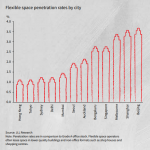Peter Hooper, chief economist at Deutsche Bank Securities, warned last week that the US Federal Reserve (Fed) is likely to turn more aggressive than it is currently indicating, and that there will be more Fed interest rate hikes than expected coming this year.

In speaking to CNBC, the economist said that despite assurances that it was going to be gradual with its tightening, the Fed will need to speed things up due to good growth, and that they are likely to indicate a shift next month at the Federal Open Market Committee (FOMC) meeting. Hooper predicted that the Fed will have four rate hikes this year instead of the three which was announced.
“The Fed’s got to worry about A: falling behind the curve and letting inflation get out of control; B: tightening too hard and pushing the economy into recession. This is a very delicate balance,” Hooper said.
The Fed interest rate were raised in March by 0.25 per cent. The increase is the first under new Fed Chairman Jerome Powell. The rate hike was much anticipated as the American economy is expected to grow in 2018, and the statistics for unemployment is near record lows.
Table of Contents
The Fed said: “In view of realized and expected labor market conditions and inflation, the Committee decided to raise the target range for the federal funds rate to 1-1/2 to 1-3/4 percent. The stance of monetary policy remains accommodative, thereby supporting strong labor market conditions and a sustained return to 2 percent inflation.”
“In determining the timing and size of future adjustments to the target range for the federal funds rate, the Committee will assess realized and expected economic conditions relative to its objectives of maximum employment and 2 percent inflation,” it added.
Powell told reporters that even with the hike in the FED interest rate, the US’ economy is “healthier than it has been since before the financial crisis. It’s a healthier economy than it has been in 10 years.” He, however, acknowledged that central bankers now consider the prospects of a global trade war as a “more prominent risk” to the economic outlook.
The Fed’s quarterly report predicted the benchmark interest rate to end this year at 2.1 per cent. This means that two more hikes are possible. The FED interest rate may rise to 2.9 per cent at the close of 2019, which means that there may be 3 more increases by that time.
Powell has said that the Fed will gradually raise interest rates toward historic averages while the economy continues to expand, and urged caution when weighing individual Fed officials’ predictions.
“I think like any set of forecasts, those forecasts will change over time and they will change depending on the way the outlook for the economy changes,” Powell said.
Neel Kashkari, president of the Federal Reserve Bank of Minneapolis and participant in the FOMC, noted that despite recovery in the US labour market, there has to be more evidence that wages are rising, before returing the Fed interest rate to normal levels.
“We should shift only to a neutral policy stance, and not move too quickly, until we see more evidence that wages are climbing and that we really are at maximum employment,” Kashkari said.
Any Fed interest rate hike is expected to have an impact on credit cards, mortgages, vehicle loans and bank savings accounts here.
This is because Singapore interest rates are closely correlated with those in the US. The SIBOR (Singapore interbank offered rate) for example, will to go up, denting some of the enthusiasm in the buoyant property market.
Since the beginning of this year, banks have raised interest rates for both fixed and floating home loan packages by 10 – 30 basis points (bps). The chief mortgage consultant of icompareloan.com, Paul Ho, believes that the DBS FHR-9 Fixed Home Rate and DBS FHR-12/24, are set to hike in June 2018.
https://www.icompareloan.com/resources/dbs-fhr-9-hike/
Some banks have already upped their mortgage rate to 2.05 per cent, to keep pace with the increasing interest rates. The 3-month SIBOR has hovered at 1.3 per cent since 12 Jan. Any further rate increase by the Fed will drive the interest rate for mortgage loans even higher.
Mr Ho noted that banks such as OCBC have moved away from fixed deposit pegged home loans and instead created the OCBC OHR which is based on the 12-year Sibor Average, this smooths out any rise and fall in short term SIBOR movements.
Those who require less volatility with their home loans may consider longer tenured Fixed deposit based rates such as those from Maybank, he added.
In an environment of rising interest rates, those seeking best home loans and real estate investors should exercise caution as it may curb the rise in property prices in Singapore. The rising interest rates, coupled with the weak rental market, may impact the buyer’s ability to service the mortgage on a property.
The Fed’s 1.75 per cent interest rate hike translates into 25 basis points (bps) increase. For every 10 basis points increase on a $100,000 loan over 25 years, the monthly installment goes up by $4.80. This means that for a $1 million loan, the buyer would have to pay an extra S$120 every month.
—
If you are home-hunting, our Panel of Property agents and the mortgage consultants at icompareloan.com can help you with affordability assessment and a promotional home loan. The services of our mortgage loan experts are free. Our analysis will give best home loan seekers better ease of mind on interest rate volatility and repayments.
Just email our chief mortgage consultant, Paul Ho, with your name, email and phone number at paul@icompareloan.com for a free assessment.






